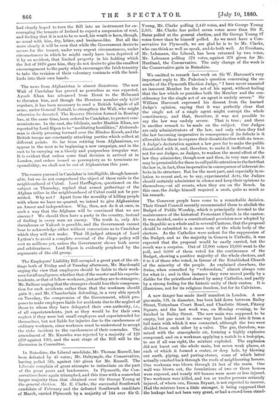We omitted to remark last week on Sir W. Harcourt's
very important reply to Mr. Puleston's question concerning the re- marks of the Plymouth Election Judge, "I have never unseated an innocent Member for the act of his agent, without feeling that the law which so punishes both the Member and the con- stituency for the single act of an agent is unduly severe." Sir William Harcourt expressed his dissent from the learned Judge's opinion, saying that it was perfectly clear that the single act of a single agent might corrupt the whole constituency, and that, therefore, it was not possible to say the law was unduly severe. That is true ; and there is another remark to be made on the subject. Our Judges are only administrators of the law, and only when they find the law becoming inoperative in consequence of its defects is it allowable for them to express their dissatisfaction with its tenor. A Judge's declaration against a law goes far to make the public dissatisfied with it, and, therefore, to make it ineffectual. It is. notfor our Judges, as Judges, to weaken the moral effect of the law they administer, though now and then, in very rare cases, it may be permissible for them to call public attention to the fact that the law is, in fact, thus inoperative in consequence of inherent de- fects in its structure. But for the most part, and especially in re- lation to recent and, so to say, experimental Acts, the Judges should certainly administer in silence and keep their opinions to themselves,—at all events, when they are on the Bench. In. this case, the Judge himself required a snub, quite as much as his remark.


































 Previous page
Previous page